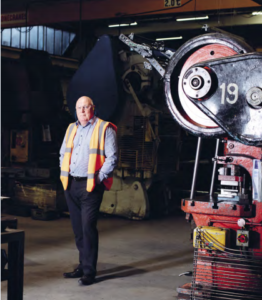News
Interview with an Exporter - P C Henderson Features in Contact Magazine for Exporting Success
by Kate Donkin on 01/04/2019
 P C Henderson has recently featured in the North East England Chamber of Commerce all new Contact Magazine to discuss the companies exporting achievements and challenges faced. Read the article below or online on page 66 here.
P C Henderson has recently featured in the North East England Chamber of Commerce all new Contact Magazine to discuss the companies exporting achievements and challenges faced. Read the article below or online on page 66 here.
Now selling its products in more than 80 territories, P C Henderson is one of the region’s most successful exporters. The key to its success? Meticulous research and taking the time to go out and understand potential markets. Mark Lane reports.
For any company looking to expand its horizons beyond UK waters, the example of folding and sliding door hardware manufacturer, P C Henderson, is surely worth considering. The company’s products can now be found in such settings as Kandahar International Airport in Afghanistan, Shanghai Disneyland in China, the Four Seasons Hotel in Tianjin, China and the headquarters of none other than Nike in the USA.
Actually, these are just a tiny handful of the markets served by a business which has been operating in the North East since 1928 and has since spread its wings to multiple countries around the globe. The company now exports to over 80 countries worldwide as well as subsidiary companies in key markets of Ireland, Holland and China.
Current top export markets include Indonesia, South Africa, USA, Australia, New Zealand and Holland. Trevor Cossins, managing director of P C Henderson says: “Our focus this year is to concentrate on two key growth markets which we have recently entered – China and Western Europe – to ensure further growth and success." China is particularly interesting. Many North East exporters have targeted this part of the world, with varying degrees of success, so it’s interesting to find out about the approach taken by Trevor and his team when entering this most complex of market places. Not surprisingly, solid research was the starting point. He explains: “Research into the Chinese market recently identified a tremendous increase in individual wealth and an increasing demand for luxury goods. This has resulted in huge growth in the Chinese hotel market where they are building numerous 5-star hotels – many of which require high quality sliding door hardware.”
While such locations offer an obvious opportunity for P C Henderson products, there are a huge number of hurdles to overcome after the initial research has identified opportunities. Continues Trevor: “Challenges faced when entering this market included how to do business, culture differences and language barriers. To counter these, our sales and marketing director, Andrew Royle, visited China along with Julius Zhu, the company’s China-based representative. Andrew and Julius engaged with various focus groups of potential customers. We wanted to demonstrate that we wish to create a positive customers experience, learn about product requirements, listen to local conditions and engage with our customers.As a result, we have developed a unique sliding door system specifically for the Chinese hotel market. We’ve also launched a Chinese translated version of our website to support growth in this area.”
The message here is that building a new export market can be all encompassing. There are no half measures if one wants to achieve full market penetration. Trevor says that his business uses agents and distributors, although even here the research is extremely thorough to ensure one is working with the right partner. “The key is to do the research into your potential partner,” he says. “Build a picture of their business, its size, sales resources, what plan do they have for your products, do they have experience in your market sector, how does it fit with the products they already offer.
“Make sure that you are not locked into them initially and where possible meet them face-to-face. Maintaining regular contact is essential to build that relationship – at the end of the day it should be a mutually beneficial
partnership.” This approach has certainly worked for P C Henderson. The company now has over 70 distributors across the world, some of which it has been working with for over 50 years. Does it help, I ask, having a British
brand at the current time? Does the ‘Made in the UK’ stamp have any of its power of years gone by? Trevor is unequivocal in his reply: “The British brand is extremely important in many markets, particularly in Asia where British manufacturing, quality and engineering is held in high regard.”
P C Henderson is certainly doing its own bit to ensure that trend continues.